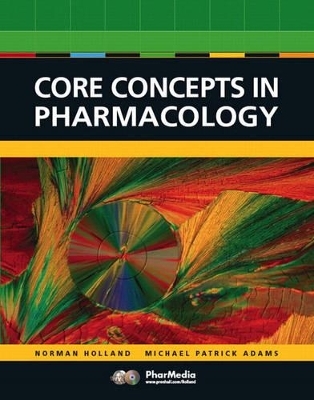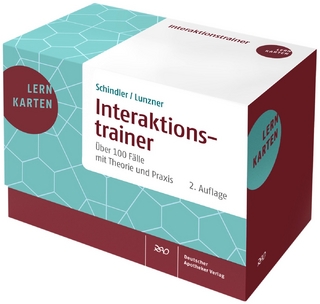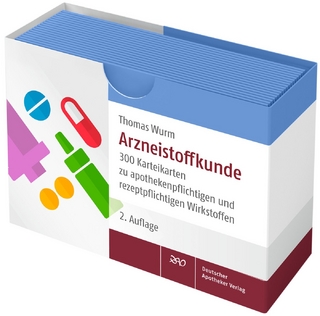
Core Concepts in Pharmacology
Pearson
978-0-13-171473-1 (ISBN)
- Titel erscheint in neuer Auflage
- Artikel merken
Leland Norman Holland, Jr., Ph.D. (Norm) is the Dean of the College of Arts and Sciences, as well as an Associate Professor of Chemistry at Southeastern University in Lakeland, FL. Formerly, he was the Chair in the Division for Health, Mathematics and Science at Pasco-Hernando Community College. He has been actively involved in teaching and preparing students for various health professions including nursing, dentistry, and pharmacy. He comes to the teaching profession after spending several years doing basic science research at the VA Hospital in Augusta, Georgia and the Medical College of Georgia where he received his Ph.D. in Pharmacology. He has taught pharmacology over the course of 10 years at both the undergraduate and graduate level. He is very much dedicated to the success of students and has assisted many in their pursuits to earn healthcare degrees. Michael Patrick Adams, PhD., R.T.(R) is the Associate Dean for Health, Mathematics and Science at Pasco-Hernando Community College. He is an accomplished educator, author and national speaker. The National Institute for Staff and Organizational Development in Austin, TX named Dr. Adams a Master Teacher. He has been registered by the American Registry of Radiologic Technologists for over 30 years. Dr. Adams obtained his Masters degree in Pharmacology from Michigan State University and his Doctorate in Education at the University of South Florida.
Unit I - Basic Concepts in Pharmacology
Chapter 1 - Introduction to Pharmacology; Drug Regulation and Approval
Chapter 2 - Drug Classes, Schedules and Categories
Chapter 3 - Methods of Drug Administration
Chapter 4 - What Happens After a Drug Has Been Administered
Chapter 5 — Herbs and Dietary Supplements
Chapter 6 - Substance Abuse
Unit II — The Nervous System
Chapter 7 — Drugs Affecting Functions of the Autonomic Nervous System
Chapter 8 - Drugs for Anxiety and Insomnia
Chapter 9 - Drugs for Emotional and Mood Disorders
Chapter 10 - Drugs for Psychoses and Degenerative Diseases of the Nervous System
Chapter 11 - Drugs for Seizures
Chapter 12 - Drugs for Pain Control
Chapter 13 — Drugs for Anesthesia
Unit III — The Cardiovascular System
Chapter 14 - Drugs for Coagulation Disorders
Chapter 15 — Drugs for Hypertension
Chapter 16 - Drugs for Heart Failure
Chapter 17 — Drugs for Dysrhythmias
Chapter 18 - Drugs for Angina Pectoris, Myocardial Infarction, and Cerebrovascular Accident
Chapter 19 - Drugs for Shock and Anaphylaxis
Chapter 20 — Drugs for Lipid Disorders
Unit IV — The Immune System
Chapter 21 - Drugs for Inflammation, Allergies, and Immune Disorders
Chapter 22 - Drugs for Bacterial Infections
Chapter 23 - Drugs for Fungal, Viral, and Parasitic Infections
Chapter 24 — Drugs for Neoplasia
Unit V — The Respiratory, Digestive, and Renal Systems
Chapter 25 - Drugs for Pulmonary Disorders
Chapter 26 - Drugs for Gastrointestinal Disorders
Chapter 27 — Vitamins, Minerals, and Nutritional Supplements
Chapter 28 - Drugs for Fluid, Acid-Base, and Electrolyte Disorders
Unit VI — The Endocrine and Reproductive Systems
Chapter 29 - Drugs for Endocrine Disorders
Chapter 30 — Drugs for Disorders and Conditions of the Reproductive System
Unit VII — The Musculoskeletal System, Integumentary System, and Eyes and Ears
Chapter 31 - Drugs for Muscle, Bone, and Joint Disorders
Chapter 32 — Drugs for Skin Disorders
Chapter 33 — Drugs for Eye and Ear Disorders
Appendix A: References
Appendix B: Answers to NCLEX-PNÔ and Case Study Questions
Appendix C: Top 200 Drugs
Index
| Erscheint lt. Verlag | 1.6.2006 |
|---|---|
| Sprache | englisch |
| Maße | 274 x 216 mm |
| Gewicht | 1497 g |
| Themenwelt | Medizin / Pharmazie ► Medizinische Fachgebiete ► Pharmakologie / Pharmakotherapie |
| ISBN-10 | 0-13-171473-2 / 0131714732 |
| ISBN-13 | 978-0-13-171473-1 / 9780131714731 |
| Zustand | Neuware |
| Haben Sie eine Frage zum Produkt? |
aus dem Bereich


